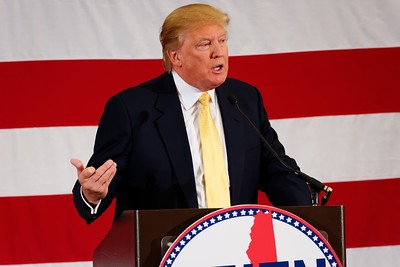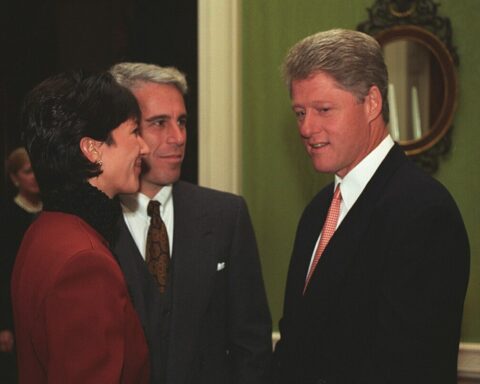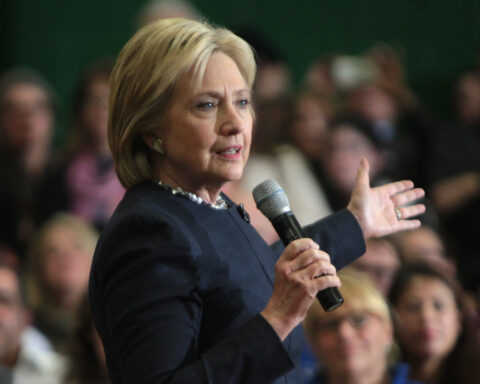President Donald Trump continued to question the conclusions of Director of National Intelligence Tulsi Gabbard over her testimony about Iran’s nuclear capabilities.
Speaking to reporters after arriving in New Jersey on Friday, Trump pushed back hard on Gabbard’s assertion that Iran was not currently developing a nuclear weapon.
During a press briefing, a reporter asked Trump, “What intelligence do you have that Iran is building a nuclear weapon? Your intelligence community had said they have no evidence that they are at this point.”
“Well, then my intelligence community is wrong. Who in the intelligence community said that?” Trump questioned.
When told that it was Gabbard, Trump said plainly, “She’s wrong.”
Q: Your intelligence community says they have no evidence that Iran is building a nuke
TRUMP: Then my intelligence community is wrong. Who said that?
Q: You director of national intelligence Tulsi Gabbard
TRUMP: She's wrong pic.twitter.com/RI9Jzouagh
— Aaron Rupar (@atrupar) June 20, 2025
Gabbard had previously testified before Congress in March, where she laid out the intelligence community’s position at the time.
She told lawmakers that Iran’s supreme leader had not given authorization for a nuclear weapons program and that, based on available data, Iran was not pursuing a nuclear weapon.
She did, however, acknowledge the concerning size of Iran’s enriched uranium stockpile, describing it as “unprecedented for a state without nuclear weapons.”
Trump’s public disapproval of Gabbard’s conclusions marks the second time in a week he has openly contradicted her.
Earlier, he said, “I don’t care what she said. I think they were close to having one.”
The remarks come as Trump considers taking more aggressive action in the escalating conflict between Israel and Iran.
The president reiterated his position that Iran should not be allowed to acquire nuclear weapons and mentioned a limited window for negotiations before the U.S. considers a direct military response.
Trump described the difficulty in pushing for a halt to Israeli strikes on Iranian targets.
“I think it’s very hard to make that request right now,” he said. In response to comments from Iran’s foreign minister, who said the U.S. should restrain Israel if Trump truly wanted diplomacy, the president offered a cautious perspective.
“If somebody is winning, it’s a little bit harder to do than if somebody is losing, but we’re ready, willing and able, and we’ve been speaking to Iran, and we’ll see what happens. We’ll see what happens,” he added.
🚨Trump on stopping Israel's airstrikes:
I think it is hard to make that request right now. If somebody is winning it's harder to do than if somebody is losing. But we are ready, willing and able… pic.twitter.com/NVqZjXB5iR
— Muhammad Ajmal (@mohammd_ajmal) June 20, 2025
He was also asked whether he would support a ceasefire, to which Trump responded, “It’s very hard to stop when you look at it — Israel’s doing well in terms of war, and I think you would say that Iran is doing less well.”
He clarified that negotiations would not be open-ended. “We’re going to see what that period of time is, but I’m giving them a period of time, and I would say two weeks would be the maximum,” Trump said.
On the topic of U.S. military intervention, Trump rejected the idea of a ground operation. “Well, I’m not going to talk about ground forces. The last thing you want to do is ground force,” he said.
While many Democrats have reacted with skepticism to Trump’s strategy, Rep. Jim Himes of Connecticut offered a rare, if measured, nod to the president’s restraint.
“The fact that we’re not reading about a U.S. attack on Iran right now actually gives me a little bit of comfort,” Himes told Jim Acosta.
Trump’s declaration of a two-week timeline has drawn mockery from critics, many of whom revived the TACO meme—short for “Trump Always Chickens Out.”
Former Republican Rep. Adam Kinzinger chimed in on the topic, pointing to a previous delay in Trump’s sanctions decision against Russia.
Just a reminder that Trump was going to announce his sanctions on Russia for not negotiating “in two weeks” about 3.5 weeks ago.
Taco
— Adam Kinzinger (Slava Ukraini) 🇺🇸🇺🇦 (@AdamKinzinger) June 18, 2025
“Just a reminder that Trump was going to announce his sanctions on Russia for not negotiating ‘in two weeks’ about 3.5 weeks ago,” Kinzinger wrote. “Taco.”
Sen. Chris Murphy of Connecticut also ridiculed Trump’s approach. “I think going to war with Iran is a terrible idea, but no one believes this ‘two weeks’ bit. He’s used it a million times before to pretend he might be doing something he’s not,” Murphy wrote on X.
However, Rep. Himes separated himself from some of his Democratic colleagues, defending the administration’s measured pace.
“We can sort of joke about TACO, and you know everything is two weeks or four weeks or never, but I think when you’re talking about war in the Middle East, going slower rather than faster is not a bad thing,” he said.







You do not look at your enemies intent. You look at their capabilities. Gabbard noted their stock of enriched uranium. She obviously doesn’t seem to know what that means.
Fake news lies on Gabbard
Set up scam,